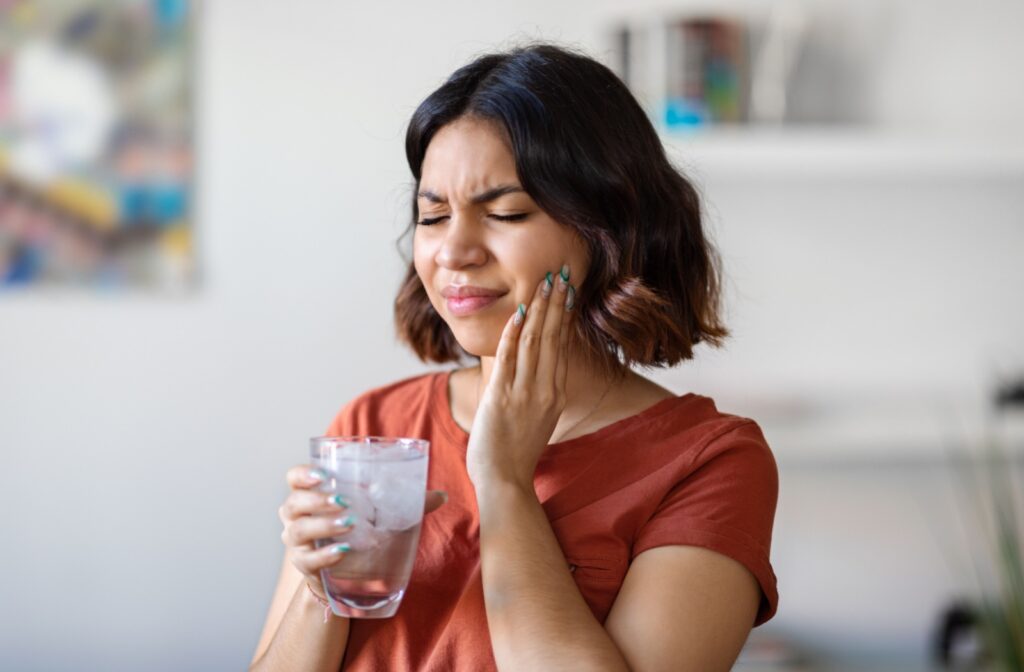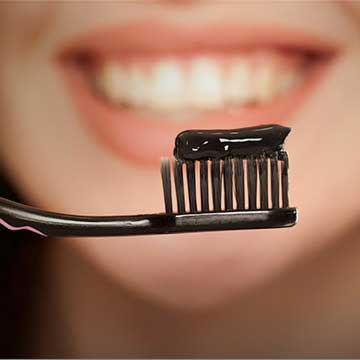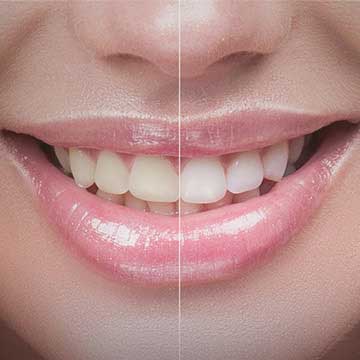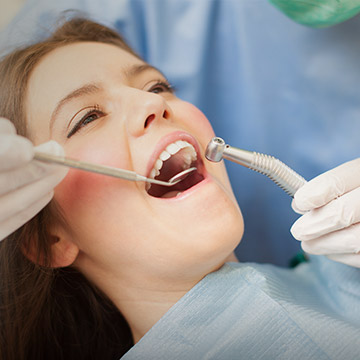Tooth sensitivity can make everyday pleasures an uncomfortable experience and can impact your overall quality of life. There are a few reasons why your teeth may be sensitive, including:
- Abrasive brushing or hard-bristled toothbrush
- Abrasive toothpaste
- Tooth decay or cavities
- Gum recession
- Recent dental procedures
- Cracked or chipped teeth
- Whitening products
Sometimes, it’s as simple as changing your brushing habits or using a different product to get relief from your sensitive teeth. Other times, like when cavities or chipped teeth from clenching are the cause, you may need a dentist’s intervention to solve the problem.
Understanding Tooth Sensitivity & Its Impact
Tooth sensitivity occurs when the protective enamel on your teeth wears down, exposing the underlying dentin. This can lead to sharp pain when consuming hot, cold, sweet, or acidic foods and beverages. The sudden onset of tooth sensitivity can disrupt your daily routine, making it challenging to enjoy your favorite treats and even affecting your ability to concentrate.
Understanding the root causes of tooth sensitivity is the first step toward finding relief and preventing future occurrences.
The Causes of Sudden Tooth Sensitivity
There are various reasons that you might be experiencing sudden tooth sensitivity.
Abrasive Brushing or Using a Hard-Bristled Toothbrush
Brushing your teeth too hard or using a toothbrush with hard bristles can wear down the enamel and expose the sensitive dentin layer. This can lead to sudden tooth sensitivity, especially when consuming hot or cold foods. Opting for a soft-bristled toothbrush and gentle brushing techniques can help protect your enamel and reduce sensitivity.
Abrasive Toothpaste or Relative Dentin Abrasivity
It is also important to use a gentle toothpaste that is not abrasive. Toothpaste can be classified by its RDA (relative dentin abrasivity), choose one around or below 70. Example: pronamel by sensodyne. Whitening toothpaste is abrasive and not recommended. The whitening effect of whitening toothpaste is limited to surface stain. If you have any exposed root surfaces or dentin whitening toothpaste is not recommended.
Tooth Decay or Cavities
Tooth decay and cavities can create tiny holes in your teeth, exposing the dentin and nerve endings. This can result in sharp, sudden pain when eating or drinking. Regular dental checkups and prompt treatment of cavities can help prevent tooth sensitivity caused by decay.
Gum Recession
Gum recession occurs when gum tissue pulls back from the teeth, exposing the roots. This can happen due to aggressive brushing, periodontal disease, or the anatomy of your teeth and bone. The exposed roots of teeth lack protective enamel, making them more susceptible to sensitivity. Maintaining good oral hygiene and seeking professional dental care can help manage gum recession.
Recent Dental Procedures
Dental procedures such as fillings, crowns, or root canals can sometimes lead to temporary tooth sensitivity. This is usually due to the irritation of the nerves during the procedure. While this type of sensitivity often subsides on its own, it’s essential to follow your dentist’s aftercare instructions and seek professional advice if the pain persists.
Cracked or Chipped Teeth
Cracks or chips in your teeth can expose the inner layers of a tooth and cause sudden sensitivity. This kind of damage can result from accidents, biting down on hard objects, or even grinding your teeth. It’s crucial to promptly address cracked or chipped teeth to prevent further damage and alleviate sensitivity.
Whitening Products or Toothpaste with Harsh Ingredients
Whitening products and some toothpaste can contain harsh ingredients that irritate the teeth and gums. Overuse or improper application of such products can lead to increased sensitivity. Opting for gentle, desensitizing toothpaste and following the recommended usage guidelines can help mitigate this issue. Bleaching products can cause sensitivity, avoid placing bleaching products on root surfaces and try a lower percentage gel to whiten more gradually.
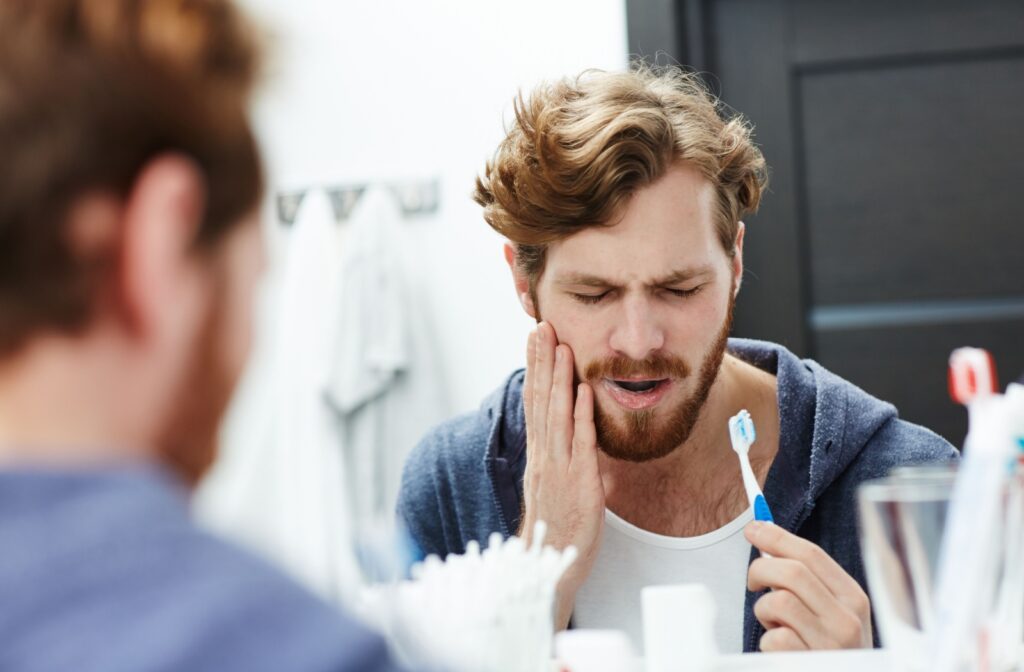
How to Manage Sudden Tooth Sensitivity
Managing tooth sensitivity ultimately depends on what’s causing the discomfort. The following are a few things you can try to relieve sensitivity.
Switch to a Softer Toothbrush & Gentle Brushing Technique
A soft-bristled toothbrush and a gentle brushing technique can help protect your enamel and reduce sensitivity. Avoid vigorous brushing and focus on cleaning your teeth thoroughly without applying excessive pressure.
Use Desensitizing Toothpaste
Desensitizing toothpaste is specially formulated to help alleviate tooth sensitivity. These products contain ingredients that block the pathways to the nerves, reducing pain and discomfort. Regular use of desensitizing toothpaste can provide relief and improve your overall oral health. Ask your dentist for recommendations on the best one to use for your situation.
Seek Professional Dental Care
If tooth sensitivity persists or worsens, it’s essential to seek professional dental care. Your dentist can identify the underlying cause and recommend appropriate treatments, such as fluoride/desensitizing treatments, a nightguard or even root canal therapy if necessary.
Avoid Acidic Foods & Beverages
Acidic foods and beverages can erode the enamel and exacerbate tooth sensitivity. Limiting your consumption of citrus fruits, sodas, and acidic foods can help protect your enamel and reduce sensitivity. Rinsing your mouth with water after consuming acidic items can also help neutralize the acids.
Fluoride Treatments
Fluoride treatments can help strengthen your enamel and reduce sensitivity. These treatments are available in various forms, including fluoride toothpaste, mouth rinses, and professional fluoride applications provided by your dentist. Regular use of fluoride products can enhance your enamel’s resistance to sensitivity.
Discuss Your Sensitive Teeth with Your Dentist
Sudden tooth sensitivity can be frustrating and painful, but understanding its causes and how to manage it can make a significant difference. Adopting good oral hygiene practices, seeking professional dental care, and making informed choices about your diet and dental products can alleviate sensitivity and protect your teeth for the future.
If you’re experiencing sudden and persistent tooth sensitivity, contact our Otara Dental team to request an appointment. We can provide personalized recommendations and treatments to help you enjoy a pain-free and healthy smile.


